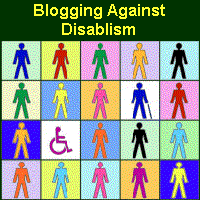(Our first of two posts for Blogging Against Disablism 2011.)
 More often than not, issues of reproduction and disability are approached solely in terms of ablebodied parents and disabled children. Of course issues like prenatal diagnosis and abortion of disabled unborn children are critical parts of the story.
More often than not, issues of reproduction and disability are approached solely in terms of ablebodied parents and disabled children. Of course issues like prenatal diagnosis and abortion of disabled unborn children are critical parts of the story.
But not all people with disabilities are children, whether unborn or already-born. Some of us are in fact adults, even if we are overlooked or infantilized. Like other humans, we are sexual and reproductive beings. And we face many forms of reproductive violence and injustice ourselves.
Namely:
- Poverty, un or underemployment, poor housing conditions, poor nutrition, poor access to medical care, transportation barriers, and other problems that often severely undercut our ability to exercise our own sexual and reproductive preferences, whatever those may be.
- Stereotypes that we are either asexual, or grotesque sexual predators.
- Stereotypes that reproduction is a nonsequitur for us, or that we are by definition “unfit” parents whose “monstrous” breeding must be forcibly stopped.
- Heightened vulnerability to sexual assault and other abuse.
- Sex education that omits or glosses over us.
- Interference with our freedom to seek out and marry the partners of our own choosing.
- A long history of outright forced sterilizations and other pressures to use family planning methods we do not want, at the same time we are denied access to contraceptives we do want and that best fit our particular needs.
- Interference with our freedom to seek out fully supported parenthood, whether biological, adoptive, or foster.
- Intense pressure to abort when we become pregnant or partner to a pregnancy.
These injustices intersect mightily with the injustices resulting, for example, in the abortion or infanticide of children with disabilities. When I was pregnant with my daughter, for instance, a physician pressured me to have an abortion because he feared she might be “defective.” “You mean, just like me?!” I responded angrily. Hell if I was going to let him have his way with us!
Despite all the difficulties of that decidedly unplanned pregnancy- poverty, my ill health, disrupted life plans for me and my boyfriend, among other problems-I did have some resources for resistance, including the confidence that I could be a good mother. But what about other women who have disabilities and/or carry potentially disabled children-what if they lack the necessary resources? I already know the answer to that question. It is saddening beyond measure.
Even when and where it starts in the womb, the prevention and healing of reproductive violence and injustice against people with disabilities must continue ever after birth. And, as the disability rights slogan says, "Nothing About Us, Without Us." All of us.
